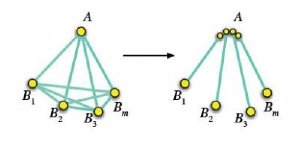Nov 23 2009
Quantum computing promises ultra-fast communication, computation and more powerful ways to encrypt sensitive information. But trying to use quantum states as carriers of information is an extremely delicate business. Now two physicists have shown, mathematically, how to gently tease out unwanted knots in quantum communication, while keeping the information intact. Their work is reported in the current issue of Physical Review Letters and highlighted with a Viewpoint in Physics.
 Physicists have shown that complicated quantum entanglements can be transformed into an arrangement where the entanglement fans out neatly from the hub qubit to each of the other qubits. Credit: Dong Yang and Jens Eisert
Physicists have shown that complicated quantum entanglements can be transformed into an arrangement where the entanglement fans out neatly from the hub qubit to each of the other qubits. Credit: Dong Yang and Jens Eisert
When two particles are entangled, they effectively act as a single entity, even though they might be on opposite ends of the galaxy. Physicists can code information into particles to make quantum bits, or qubits, then entangle the qubits in an orderly fashion to form an entangled bit, or ebit. Ebits can then be used to create incredibly tough codes or teleport information between two distant systems. But messy entanglements among particles make qubits more susceptible to losing their encoded information.
Now Dong Yang and Jens Eisert of the University of Potsdam have shown how to delicately comb out a snarl of entanglements among many qubits while keeping the information intact. They designate one qubit as a hub and then use a combination of two existing quantum protocols to transform the original cat's cradle into an arrangement where entanglement fans out neatly from the hub qubit to each of the other qubits. This looks like a primitive model for a quantum World Wide Web: individual users each form an ebit with a single quantum search engine, and send queries and receive results via quantum teleportation.